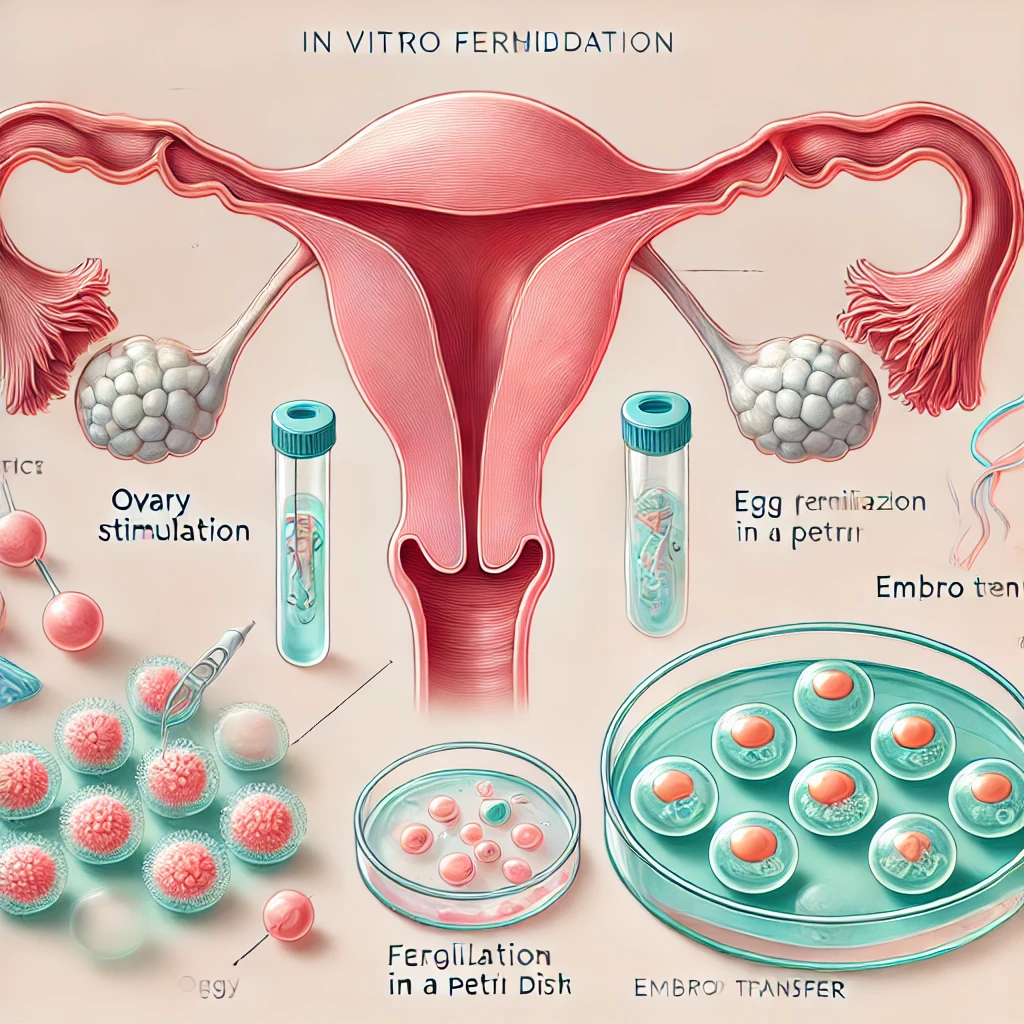IVF Implantation Process
ToggleUnderstanding the IVF Implantation Process: A Comprehensive Guide
In vitro fertilization (IVF) has revolutionized the field of reproductive medicine, offering new chances to millions of couples struggling with infertility. One of the most critical steps in the IVF journey is the implantation process, where the fertilized embryo is transferred to the uterus to achieve a successful pregnancy. This article delves into the intricate details of the IVF implantation process, providing a thorough understanding and explanation for each step involved in the process.

What is IVF?
Before diving into the implantation process, it is essential to understand what IVF entails. In vitro fertilization is a medical procedure in which eggs are retrieved from a woman’s ovaries and fertilized by sperm in a laboratory setting. The fertilized eggs, now called embryos, are then cultured for several days before being transferred into the woman’s uterus. The ultimate goal is for the embryo to implant in the uterine lining, leading to pregnancy.
The IVF Implantation Process: Step-by-Step
The IVF implantation process is generally a culmination of various steps, our experienced team of professional doctors At Best Life Fertility Center makes sure that each step is meticulously planned and executed to increase the chances of a successful pregnancy.
Let’s break down the process into its key stages.
1. Ovarian Stimulation
The first step in the IVF process is ovarian stimulation. Fertility medications are prescribed to stimulate the ovaries to produce multiple eggs in one cycle. This is crucial because having multiple eggs increases the chances of obtaining viable embryos for implantation. The stimulation process typically lasts for about 10-14 days, during which the patient’s response to the medication is closely monitored by highly experienced professionals at Best Life Fertility Center through blood tests and ultrasounds.
2. Egg Retrieval
Once the eggs have matured, they are retrieved from the ovaries through a minor surgical procedure called egg retrieval. This procedure is usually performed under mild sedation to ensure the patient’s comfort. A thin needle is guided through the vaginal wall into the ovaries, where the eggs are gently aspirated. The retrieved eggs are then taken to the laboratory for fertilization.
3. Fertilization and Embryo Culture
In the laboratory, the retrieved eggs are fertilized with sperm, either through conventional insemination or intracytoplasmic sperm injection (ICSI), depending on the specific needs of the couple. The fertilized eggs are then cultured in an incubator, where they develop into embryos over the next few days. The embryos are closely monitored by our esteemed team of doctors at Best Life Fertility Center, and their development is tracked to identify the most viable candidates for transfer.
4. Embryo Selection
After a few days of culture, typically 3-5 days, the embryos are evaluated for quality. The selection process involves assessing the embryos’ appearance, cell division rate, and overall development. In some cases, preimplantation genetic testing (PGT) may be performed to screen the embryos for genetic abnormalities, further aiding in the selection of the best embryos for transfer and increasing the chances of a successful pregnancy.
5. Embryo Transfer
The embryo transfer is the critical step in the IVF implantation process. The selected embryo(s) are carefully loaded into a thin catheter, which is then gently guided through the cervix into the uterus. The transfer procedure is relatively quick and painless, often requiring no anesthesia. The positioning of the embryo in the uterus is crucial for implantation, so the process is conducted with utmost precision.
6. Luteal Phase Support
Following the embryo transfer, the luteal phase (the second half of the menstrual cycle) is supported with hormonal medications, primarily progesterone. Progesterone helps prepare the uterine lining for implantation and supports early pregnancy. This phase is critical as the success of implantation largely depends on the hormonal environment within the uterus.
7. Implantation
Implantation is the process where the embryo attaches itself to the uterine lining (endometrium). For a successful pregnancy, the embryo must implant and establish a connection with the maternal blood supply. This process typically occurs 6-10 days after the egg retrieval or 1-5 days after the embryo transfer, depending on whether a fresh or frozen embryo is used.
During implantation, the embryo releases enzymes that help it penetrate the endometrium. The uterine lining, which has been thickened by progesterone, responds by enveloping the embryo. After a successful implantation, the embryo will continue to develop into a fetus, and pregnancy is established.
8. Confirmation of Pregnancy
About two weeks after the embryo transfer, a blood test is performed to check for the presence of human chorionic gonadotropin (hCG), a hormone produced by the developing embryo. A positive hCG result indicates that implantation has occurred and that the patient is pregnant. Further monitoring, including ultrasounds, will be conducted to confirm the viability of the pregnancy.
Factors Affecting the IVF Implantation Process
While the IVF implantation process is carefully orchestrated, several factors can influence its success. Our team of expert doctors at Best Life Fertility Center will help you understand these factors which are crucial for patients undergoing IVF treatment.
1. Embryo Quality
The quality of the embryo is one of the most significant factors affecting implantation success. High-quality embryos have a better chance of implanting and developing into a healthy pregnancy. Embryo quality is determined by many factors including cell division rate, symmetry, and the presence of a clear, intact inner cell mass. Embryos that pass preimplantation genetic testing (PGT) for chromosomal normalcy also have higher implantation rates.
2. Uterine Receptivity
The receptivity of the uterine lining is another critical factor. The endometrium must be in an optimal state to allow the embryo to implant. Several factors can influence uterine receptivity, including hormonal balance, the thickness of the endometrial lining, and the presence of uterine abnormalities such as fibroids or polyps.
3. Age
Age is a well-known factor in fertility, and it also plays a role in the IVF implantation process. Younger women generally have a higher likelihood of successful implantation due to better egg quality and uterine receptivity. As women age, egg quality declines, and the chances of chromosomal abnormalities in embryos increase, which can affect implantation success.
4. Lifestyle Factors
Lifestyle choices can impact the success of the IVF implantation process. Factors such as smoking, excessive alcohol consumption, poor diet, and high stress levels can negatively affect both egg quality and uterine receptivity. Patients are often advised to adopt a healthy lifestyle, including a balanced diet, regular exercise, and stress-reduction techniques, to optimize their chances of success.
5. Underlying Health Conditions
Certain health conditions can affect the success of the IVF implantation process. Conditions such as polycystic ovary syndrome (PCOS), endometriosis, Thyroid disorders and autoimmune disorders can create a challenging environment for implantation. Managing these conditions through medical treatment and lifestyle changes is essential to improve implantation outcomes.
Enhancing the Chances of Successful IVF Implantation
While the IVF implantation process is complex, there are steps that patients can take to enhance their chances of success.
1. Optimizing Embryo Quality
Patients can optimize embryo quality by following their fertility specialist’s recommendations for ovarian stimulation protocols. Our fertility specialists at Best Life Fertility Center will guide you through the treatment with the proper management of medications, close monitoring, and help you adopt a healthy lifestyle which can all contribute to producing high-quality eggs and embryos.
2. Preparing the Uterus
Ensuring the uterus is in the best possible condition for implantation is vital. Patients may be advised to take certain supplements or medications, to support uterine health. Addressing any uterine abnormalities, such as fibroids or polyps, before undergoing IVF can also improve outcomes.
3. Timing the Embryo Transfer
Timing is critical in the IVF implantation process. Transferring the embryo when the uterus is most receptive increases the chances of successful implantation.
4. Managing Stress
The emotional journey of IVF treatment is also important, and high stress levels can negatively impact the IVF implantation process. Patients are encouraged to practice stress-reduction techniques such as mindfulness, meditation, yoga, and counseling to maintain emotional well-being throughout the treatment.
5. Following Post-Transfer Guidelines
After the embryo transfer, patients are often advised to follow specific guidelines to support implantation. These may include avoiding heavy lifting, refraining from intense physical activity, and maintaining a calm and relaxed environment. It is important to follow the advice of the fertility specialist to optimize the chances of success.
Conclusion
The IVF implantation process is a critical step in the journey toward achieving a successful pregnancy through in vitro fertilization. At Best Life Fertility Center, we will help you understand the intricacies of this process, including the factors that influence success and the steps that can be taken to enhance implantation, in order to empower patients to make informed decisions and increase their chances of a positive outcome.
While the IVF journey can be challenging, advancements in reproductive medicine continue to offer great opportunities and possibilities for couples struggling with infertility.
Our long experienced doctors in the field of reproductive health At Best Life Fertility Center will help you optimize the IVF implantation process and take proactive steps to support embryo quality and uterine receptivity, in order to maximize your chances of achieving the dream of parenthood.

